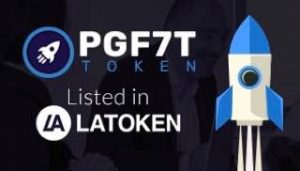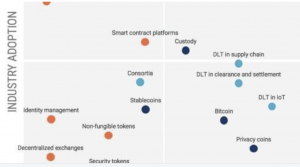
We are happy to annunce that PGF7T will be listed on LATOKEN Exchange on May 28, 2019!
PGF500 Team

Bloggin internal news

We are happy to annunce that PGF7T will be listed on LATOKEN Exchange on May 28, 2019!
PGF500 Team
Payment with PGF7T Token is working and will be available at the end of the ICO, after April 30, 2019.
For more information about PGF7T you can connect to the web site https://etherscan.io
At the moment, to proceed with the Payment is necessary to use and launch the Web application METAMASK https://metamask.io




An analysis of emerging blockchain trends using the CB Insights NExTT framework.

https://www.cbinsights.com/research/report/blockchain-trends-2019/
Dapp.com Ranking is a comprehensive data tool to analyze and evaluate apps built on blockchains. Using extensive statistics covering dapp contract performance, user performance and community activities, our ranking system utilizes an attention-based model and an adaptive learning algorithm to evaluate dapps comprehensively. Multiple criteria are assessed, including dapp balance, user interactions, dapp risk assessment, the degree of health, community activities and more. See detail for full explaination of Dapp.com Ranking 2.2.1.
Blockchain has risen to prominence in the last year, with more than $18B raised over the past year. Several companies are attempting to apply the technology to the healthcare space, some with stronger use cases than others.
We’ll talk about several applications, their feasibility, areas of opportunity, and which companies should be worried.

Many initial coin offerings (ICOs) were tickets to quick riches in 2017. Take a token called Status—it was issued in June, raised about $100 million and soared 1,200% within six months. It’s easy to get excited by crypto’s surging prices. But now that the market has corrected somewhat and it’s clear that tokens both rise and fall, it’s prudent to determine whether the virtual asset you’re buying has merit and utility in the real world.
1. Who’s the team behind the coin?
Much like the venture capital world, the founding can make or break a crypto asset. When evaluating a coin’s developers, look beyond education to find out what projects they’ve built, says bitcoin investor and researcher Tuur Demeester. He likes to see that developers are “respected in the fields of cryptography, memory compression, peer-to-peer networks and large open-source projects.” The more knowledge and experience they have, the less likely they’ll be to repeat past mistakes that have plagued other crypto coins.
And try to evaluate the team’s integrity. Chris Burniske, co-author of the book “Cryptoassets”and a partner at crypto investment firm Placeholder Ventures, tells Forbes it’s important to “get to know the developers. If not in person, through podcasts, videos or talks.” Do they explain their project clearly, or do they seem evasive when answering questions? Do their motivations seem sound?
2. Read the white paper and ask what problem the coin is trying to solve
Developers typically publish a white paper that explains the software and economics behind a coin, and investors should read it with a critical eye. Cryptocurrencies’ main reason for existence is decentralization—they’re controlled by many people instead of a single, central authority. In crypto theory, that’s good because central authorities are more susceptible to incompetence and corruption. The white paper should clearly explain why the digital asset benefits from decentralization, Chris Burniske and Jack Tatar write in “Cryptoassets.”